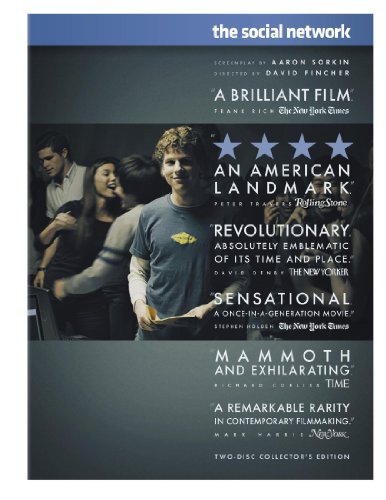All Nonfiction
- Bullying
- Books
- Academic
- Author Interviews
- Celebrity interviews
- College Articles
- College Essays
- Educator of the Year
- Heroes
- Interviews
- Memoir
- Personal Experience
- Sports
- Travel & Culture
All Opinions
- Bullying
- Current Events / Politics
- Discrimination
- Drugs / Alcohol / Smoking
- Entertainment / Celebrities
- Environment
- Love / Relationships
- Movies / Music / TV
- Pop Culture / Trends
- School / College
- Social Issues / Civics
- Spirituality / Religion
- Sports / Hobbies
All Hot Topics
- Bullying
- Community Service
- Environment
- Health
- Letters to the Editor
- Pride & Prejudice
- What Matters
- Back
Summer Guide
- Program Links
- Program Reviews
- Back
College Guide
- College Links
- College Reviews
- College Essays
- College Articles
- Back
The Social Network
“The Social Network” is a film that garnered much hype and discussion upon its release in October and has continued this notoriety with a recent slew of Golden Globe and Oscar nominations. The film tells the story of Mark Zuckerberg (Jesse Eisenberg), the founder and creator of Facebook. Beyond the creation of Facebook, this movie is also about acceptance, something that we all strive for throughout our lives. The setting for this drama is on the campus of Harvard University, where Zuckerberg is a student in 2003.
In the opening scene of the movie the viewer meets Zuckerberg sitting in a bar with his girlfriend, Erica Albright (Rooney Mara). At first glance, Mark appears to be the computer geek that we expect him to be. He is awkward in his conversation as he jumps from idea to idea, speaking his mind regardless of whom his comments may hurt.
Through the dialogue, the viewer realizes that Mark is intensely competitive. This quality is revealed in his heated discussion with Erica about the importance of being accepted into one of Harvard’s all male social societies called “Final Houses.” The conversation ends with Erica breaking up with Mark. Erica dumps Mark by saying, “You’re going to be successful and rich. You’re going to go through life thinking that girls don’t like you because you’re a geek. I want you to know, from the bottom of my heart, that won’t be true. It’ll be because you’re an a-hole.” Erica’s parting comments to Mark foreshadow the events to come in the film.
Triggered by rejection, Mark commits a series of revengeful acts culminating with his creation of FaceMash.com, a Harvard-only coed comparison site. Aided by his best friend, Eduardo Saverin (Andrew Garfield), Mark writes an algorithm and creates a program where Harvard University students can compare and rate the female students. The FaceMash site quickly catches on, and in a few hours, the Harvard University network crashes. Mark, who up to this point had very little notoriety, is now the talk of the campus.
Subsequently, Mark is summoned to Porcellian, the most sought after Finals House. This invitation is exactly what Mark has been striving for, to be accepted by the most elite group on campus. Upon entering Porcellian, Mark is greeted by the Winklevoss twins (Armie Hammer), who serve as much of the comedic relief throughout the film. Mark is told that he must remain in the stairway and cannot precede any further because he is not a member. To his surprise, Mark realizes that this is only a business meeting and he has not gained admission into Porcellin. The Winklevoss twins present to Mark their idea of creating an exclusive network site where Harvard men and women can meet and interact. Despite Mark’s feeling of rejection, he agrees to work with them on developing the site.
Feeling angry and rejected, Mark does very little to develop the site. Instead, he takes the idea of a social networking site and develops it further without the inclusion of the Winklevoss twins. Once again, with the help of his best friend and business partner, Eduardo, Facebook is launched. While Mark is very much the brains behind the operation, Eduardo provides the funding. Thereafter, Facebook quickly spreads from college campus to college campus with no signs of slowing down.
As the story unfolds, Mark winds up entangled in two simultaneous lawsuits with the Winklevoss twins and Eduardo over ownership of Facebook. In the process of creating a social networking site, Mark has managed to destroy any meaningful relationship that he had previously had. In his effort to gain acceptance and the notoriety he had never possessed, Mark manages to isolate himself. Near the end of the movie, a young attorney working on Mark’s case says to him, “You’re not an a-hole Mark. You’re just trying so hard to be one.” Ultimately, Mark has lived up to his ex-girlfriend’s prediction.
“The Social Network” is a compelling movie of our generation. Anyone who is familiar with Facebook will find this drama intriguing because Facebook has changed the social makeup and interactions of this generation. However, a simple overview of Facebook’s creation would not suffice in entertaining an audience or receiving critical acclaim. “The Social Network” thrives on the complexity of Zuckerberg’s character and his ultimate quest, not simply to create a business empire, but to gain social acceptance through doing so. By balancing drama with humor, The Social Network tells the story of Facebook, but more importantly shows one’s battle to find acceptance in a society where you are constantly being judged.
Similar Articles
JOIN THE DISCUSSION
This article has 1 comment.

